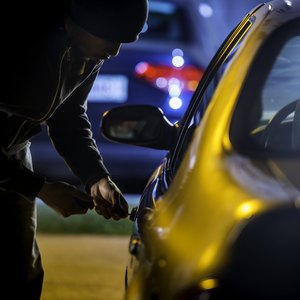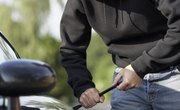
If you have full insurance, meaning comprehensive and collision coverage, your insurance company guides you through the process after you file a stolen vehicle report with the police. Full insurance coverage reimburses you for car theft. Insurers don’t like it when you make a theft easy by leaving your keys in the ignition and the car running, for example, but usually provide compensation. Be sure to read your policy carefully for language that might exclude coverage.
Tips
If you have both comprehensive and collision coverage for your vehicle, you will most likely be reimbursed if your car is stolen. Some policies have exceptions to this rule, so be sure to thoroughly examine your policy before making a claim.
Comprehensive Security
Basic car insurance might cover personal injury protection and includes liability insurance if you injure another motorist or damage another car or property. State laws vary on required insurance, but you won’t have coverage for theft if you don’t take comprehensive and collision coverage. Full insurance covers you if your car gets stolen or receives damage from the theft. Comprehensive and collision insurance costs more, but saves you in the long run, even if it’s just for peace of mind.
Information for Police
Contact the police immediately when you discover your car has been stolen. You might want to check local impound lots if you can, in case a stolen car has been recovered or it was towed because you parked it improperly. Have all information ready when you call or visit the police, including the car license plate number, make, model, year and color. Having the car’s vehicle identification number, or VIN, helps in locating the vehicle. Although the unique 17-character number appears on your dashboard or other parts of the car, you can also find it on car titles and insurance policies.
Proper Reporting
When you file the police report, note any dent marks, paint discoloration or other distinguishing features that help the police in recovering the car. List possessions you have in the car on the report. Full or partial coverage might also include valuable items, such as laptops or tools, depending on your insurance policy. The insurance company requires a copy of the police report to process claims.
Contacting the Insurance Company
Have information from the police report and car title ready when you contact your insurance company. Contact information appears on your insurance card and policy. The insurance representative might also ask for further descriptions on your vehicle, such as mileage, maintenance repair information or receipts and contact information for other people with access to the car. Your insurance company might also ask about renters or home insurance policies that cover personal items in the stolen car.
While Waiting
Insurance coverage often includes rental reimbursement or public transportation costs during the time you have no car. You will most likely pay upfront costs and receive compensation later. Keep in touch with the police and insurance company on the status of your vehicle. If you or someone else finds the car, contact the police as well as your insurance company immediately. Full coverage provides you with the full value of your car if it has not been recovered. Depending on the terms of your policy, you can usually expect a settlement check after 30 days or receive compensation if your recovered car received damages from the theft.
References
- Bankrate: Does Car Insurance Cover All Theft?
- Geico: What to Do After a Theft
- AutoGuide.com: What to Do If Your Car Has Been Stolen
- Allstate. "Are Your Belongings Covered If They Are Stolen From Your Car?" Accessed Nov. 13, 2019.
- USA.gov. "Property Insurance," Accessed Nov. 12, 2019.
- Allstate. "Does Car Insurance Cover Theft?" Accessed Nov. 13, 2019.
- National Highway Traffic Safety Administration. "Vehicle Theft Prevention," Page 10. Accessed Nov. 12, 2019.
Writer Bio
Jerry Shaw writes for Spice Marketing and LinkBlaze Marketing. His articles have appeared in Gannett and American Media Inc. publications. He is the author of "The Complete Guide to Trust and Estate Management" from Atlantic Publishing.

